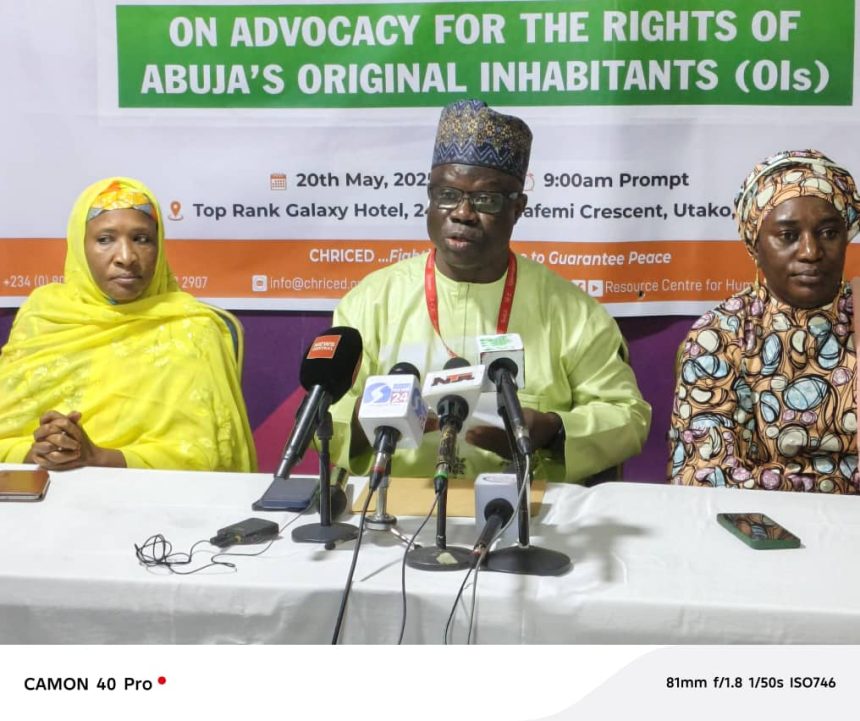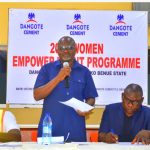By Angela Atabo
The Resource Centre for Human Rights and Civic Education (CHRICED) has unveiled a new initiative to promote the political, economic, and cultural rights of the Abuja Original Inhabitants (OIs).
According to the Executive Director of CHRICED, Dr Ibrahim Zikirullahi, at a news conference on Tuesday in Abuja, the transformative two-year initiative was supported by the John D. and Catherine T. MacArthur Foundation.
The objective, Zikirullahi said, was to create a historical repository and enhance the capacity of the indigenous people of Nigeria’s Federal Capital Territory (FCT), Abuja.
“This intervention represents a significant milestone in our collective pursuit of equity, inclusion, justice, and dignity for the Original Inhabitants of the FCT.
“Building on the successes of the previous phase, we remain committed to addressing the longstanding injustices and systemic marginalisation faced by these communities.
“With support from the MacArthur Foundation, CHRICED is launching today, a transformative initiative aimed at strengthening the institutional, advocacy, and mobilization capacities of grassroots Original Inhabitant (OI) organizations.
“This project is designed to empower OI communities by providing technical training, mentorship, and funding support to nine OI-led organisations.”
Zikirullahi said that additionally, the project would equip communities with tools to document human rights violations and engage in evidence-based advocacy.
He said that a key focus of the initiative is amplifying the voices of women, youth, and persons with disabilities within OI communities, ensuring their inclusion in decision-making processes.
He added that the project would also engage policy actors at all levels to advocate for reform, representation, and rights restoration.
He said furthermore, it would foster dialogue, unity, and collective action across diverse OI groups, reinforcing solidarity in the struggle for justice and equity.
The Executive Director said that a major innovation within the new project would be the establishment of the Abuja Heritage Centre dedicated to preserving and revitalising the history, traditions, and cultural heritage of the 17 Chiefdoms of Abuja’s indigenous peoples.
He said the centre marked a historic step toward institutionalising the identity, knowledge, and legacy of Abuja’s Original Inhabitants.
Zikirullahi said the Centre when completed, would serve as a hub for preserving and promoting indigenous history, traditions, arts, and crafts and creating valuable opportunities for scholarly research, academic discourse, and historical documentation related to Abuja’s original inhabitants.
He said the centre would offer postgraduate scholarships, particularly for women and girls of OI descent, to encourage research on indigenous issues.
This, he said was because in light of Nigeria’s ongoing struggles with legitimacy, inequality, and deepening citizen disillusionment, addressing historical injustices is both urgent and necessary.
He said that many OI communities continued to experience lack of potable water, healthcare facilities, infrastructure, and economic opportunities, highlighting the need for inclusive national development.
“Moreover, in a country striving to build a shared national identity, the continued cultural erasure and political exclusion of Abuja’s Original Inhabitants contradicts the principles of federalism and justice.
“By supporting, energising, and uniting OI groups, this initiative empowers communities to take ownership of their advocacy and development agenda.
“This project is a bold and unprecedented effort to ensure that OIs are recognised, represented, and actively engaged in shaping the future of Abuja,”he said
Zikirullahi said that through collaborative action, research, and policy engagement, CHRICED would help to lay the foundation for a more inclusive and just society.
He therefore, urged the Federal Government and National Assembly to address the constitutional gaps that have left the Original Inhabitants (OIs) of the FCT stateless and landless.
He called on the FCT Administration to prioritise investment in infrastructure, education, clean water and healthcare within OI communities and cease the demolition of OI homes and the appropriation of their ancestral lands.
He urged development partners and the media to amplify OI voices and support grassroots initiatives and also urged OI organisations and communities to unite in collaboration and remain steadfast in their pursuit of justice, equity, and dignity.(NAN)












